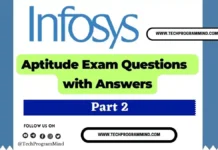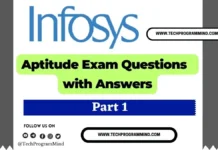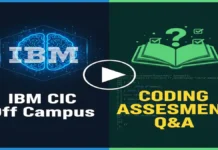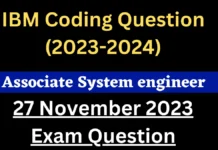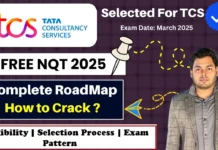Infosys Verbal Ability questions and Answer – Part 2: In this post, we continue with Infosys Verbal Ability Previous Questions 2025 – Part 2 (Q16–35). These questions cover reading comprehension, sentence correction, and logical reasoning.
Blog Post 1 – Infosys Verbal Ability Previous Questions 2025 (Part 1: Q1–15 with Answers): Check Here
Infosys Verbal Ability questions and Answer – Part 2 Start Here
Directions for Questions 16 – 25: The following passages are followed by questions. Based on the content in the passage, choose the best answer choice for each question.
Passage Start
The decline of the news media’s role as a public trust has affected its obligations to civil society. Journalists and their supporters from many countries share a strong conviction that market pressures are undermining the quality of Journalism; specifically, as news organizations preserve high profit levels by reducing news gathering resources and neglecting Journalism in the public interest, the fundamental role of the press to inform and empower citizens is endangered. A free and independent press is essential to human liberty. No people can remain sovereign without a vigorous press that reports the news, examines critical issues and encourages a robust exchange of ideas. In recognition of the vital role of the press in society, many countries extend it special legal protections under constitutions or legislatively enacted statutes. These protections are unique, for they safeguard print, broadcast and online media organizations against government interference and censorship. Where this special status has been accorded, the press, news organizations have been held to a high standard of public service and public trust. Overtime, this ideal has become a bedrock of Journalism, an enduring tradition by which a free press has been a powerful force for progress and informed citizen participation in society.
Historically, threats to press freedoms have been political in nature. At the start of the 21st century, however, a new kind of threat emerges that, if continued, will endanger the freedoms guaranteed to the press and put at risk the sovereignty of the citizens. The nature of the press as a commercial enterprise has changed significantly. The emergence of media conglomerates and intense market competition are creating new organizational priorities in which profit growth is replacing public service as the principal mission. Sustaining profit growth often requires reducing the resources for news gathering, thereby diminishing the role of the news media as a public trust. Business priorities are encouraging the blending of news and entertainment as a strategy to build audiences and ratings. This trend, most noticeable worldwide in television, has led to the reduction in serious news coverage and may be responsible for a decline of public confidence in this medium as an essential source of information. Finally, a shrinking commitment to both domestic and international news means that news organizations are missing opportunities to connect people and ideas globally at the very time technology has made such connections increasingly possible. The international group of Journalists and supporters of press freedom calls on the leaders of news organizations worldwide to recognize the need for a wiser balance between Business goals and public-service responsibilities, and to reaffirm their commitment to Journalism and the role of a free press in sustaining human liberty.
We recognize that news organizations function in a competitive, multimedia environment, and that financial strength is essential for Journalists excellence and independence. However, an unbalanced emphasis on profits and financial growth weakens the foundation of Journalism as a public trust. We are convinced that the growing imbalance in the priority given to the quality of Journalism and profit growth ultimately impairs citizens’ ability to participate fully in their communities. We recognize that neglecting the public interest erodes public support for legal guarantees of the freedom of the press to report the news.
Q16. It can be inferred from the passage that
A. democracy can continue even if freedom of press is endangered.
B. freedom of press will maintain the sovereignty of people.
C. till date, freedom of press has never been questioned.
D. freedom of press puts at risk the sovereignty of the citizens.
Answer: B. freedom of press will maintain the sovereignty of people
Q17. What is the special status that has been allowed to press?
A. High standard of public service and public trust.
B. Informing and empowering citizens.
C. Informed citizen participation in journalism.
D. Legal protection against censorship.
Answer: D. Legal protection against censorship
Q18. The new kind of threat to the freedom of press is
A. reduction of resources.
B. diminished role of media as a public trust.
C. Commercialized organizational priorities.
D. Lack of technical expertise.
Answer: C. Commercialized organizational priorities
Q19. The author’s attitude towards the influence of market presence on free journalism is that
A. it may have some faults, but it has an overall good intention.
B. A formerly enduring tradition of free press has been taken over by priorities for profit growth.
C. Of an objective and disinterested writer.
D. He has accepted the change and is trying to present it in a favorable light.
Answer: B. A formerly enduring tradition of free press has been taken over by priorities for profit growth
Q20. It can be inferred that obligations of press to civil societies are all the following EXCEPT:
- Inform and empower citizens.
- Report the news and examine it.
- Entertain the people.
- Link people globally.
A. 1, 2, 3
B. 2, 3, 4
C. None of these – 1, 2, 3, 4
D. 1, 2, 3, 4
Answer: A. 1, 2, 3
Second Passage Start
The spread of library facilities is vital for the education of the masses and dissemination of ideas and information. In this context, the decision of the Haryana Government to open about 75 public libraries at the native places of the Kargil heroes of the state, is quite commendable and worth emulating. As India largely lives in its (5, 79, 148) villages, the facility is most needed and welcome there. Several efforts in this direction are being made, the most glaring being the contribution of Raja Ram Mohan Roy Foundation, Calcutta. It has several schemes to help and enrich public libraries; it provides the states three matching and six non- matching grants towards books and infrastructure. University/college libraries are entitled to UGC grants. In states like Himachal Pradesh, the senior secondary school libraries have also been converted into public libraries, in order to get the grant.
Although the opening of more and more libraries is a setup in the right direction, the problem is that, in most regions, the quality of library service is not up to the mark. The basic reason is the lack of reading habit; the world of books does not seem to attract or interest us. The public, in general, is not greatly interested in reading. Now even our teachers/scholars are not fascinated towards books and are not proud to have a personal library like Mr. Darcy in pride and prejudice. In an interview conducted for school heads in the state, around 100 teachers were asked a simple question: what would be your first ten preferences to spend the arrears you would get as a consequence of revision of your pay-scales? None of the teachers mentioned books/journals as one of the possible items.
In one of the prestigious universities in the country, a survey report revealed that not even five percent of the teachers take books from the library. Once somebody anxiously asked the librarian of an educational institute: “What are the new books received in the library?” the librarian gently quipped, “have you read the old ones?” everybody complains about persistent reduction in grants and financial sanctions. Paucity of funds and repeated cuts in grants is the general refrain of many. One feels that books have become very expensive. Enhanced grants should be made available. But the million-dollar question is: when many are not keen to take advantage of the existing holding, why should more money be pumped into the system? The common experience is that library facilities are often asked for, insisted upon, but rarely made use of. It is not just a chance that even three percent of the research done in India is not recognized abroad. Also numerous cases of pseudo-scholarship and plagiarism are coming to light. Once, by way of experiment, the principal of a post-graduate college kept the library open throughout the day for over a month and found that only a few readers came to study books. There were those who visited to borrow books, but did not read, and at times not even cared to return them. Books pertaining to syllabi generally remained with the academic faculty for years together. Cases of tearing/destroying pages from books and stealing them from the library are on the increase all over the country. One is remained of the scholar’s advice to his friend: “Don’t lend books, nobody returns them.” Then, pointing to books in his own rack, he politely said’ “All these books have been lent to me by some people.” Oscar Wilde aptly feels that good literature is generally unread, journalism unreadable.
Most librarians complain of heavy loss of books and naturally, they are reluctant to issue/circulate them. Some institutions have been even done away with the open-shelf system after such bitter experiences. Library services in many regions are in deplorable conditions. It is the use of existing facilities that matters most. Public libraries, in most states, are managed through the Library committees under the chairmanship of district collectors or deputy commissioners, who often have no time for or interest in these institutions. In one district, located in the biggest district of the state, having 22.70 percent population of the province, even toilet facilities are not available. In several states, librarians are just matriculate. In one Library located in the tribal belt, a peon is in charge of a Library. In senior secondary schools, they are not included among the” functional staff”. The posts are thus kept vacant for years together. They are included among the “vacation staff” in colleges. Hence, their libraries remain closed for over four or five months in a year. There is no annual stock checking or updating. The timings for public libraries are usually the same as that of the general office time. Naturally, not many will be able to make us of the facility.
Over the years, electronic media has assumed great importance, giving immense boost to the print media. A large number of books and magazines are coming out every year. There were as many as 3,740 newspapers in India in 1993, the number rose to 4,093 in 1994. But our libraries are unable to subscribe too many of them since the financial sanctions are barely nominal.
Libraries often have a deserted look mainly because no attention is paid towards maintenance. Senior secondary schools often lack adequate Library facilities, and in the rural areas these are particularly conspicuous by their absence. These Libraries often appear to be just “godowns” with reading material, making it difficult to fish out the required book. Librarians and heads of institutes often grumble about their own difficulties —- lack of staff, inconvenient timings, shooting prices of books / journals, book-thefts, damage caused due to silver fish, ants, rats, and so on. Several institutions experimented with “textbook” and “reference” sections in the library, with the help of the grants from the UGC and other agencies.
However, in most cases the innovation did not work well at the grassroots level. The common tendency among the members / readers is not to return good or rare books —-they choose to call them lost and pay the price, at old rates. Numerous measures adopted to check this proved futile. It is also essential to review and revise the procedures of the Raja Ram Mohan Roy Foundation Grants Award. At present, the state education department, usually on the condition of 25 percent rebate, invites samples and selects books through subject/language committees. As and when the selected books are received, payments are made directly by the foundation.
The process is quite long and cumbersome, and payments are made very late. As a result a large number of publishers do not choose to apply under the scheme. We should revise the scheme in the light of past experience and make it attractive and meaningful. We should also arrange regular orientation courses for Librarians and frame comprehensive Library Regulations in each state.
Directions for Questions 21–25: Based on the passage
Q21. The primary purpose of the passage is to
A. discuss the importance of books kept in the libraries.
B. discuss the spread of library facilities in India.
C. discuss the reluctance of reading on the part of the public.
D. discuss the neglect of libraries by people and authorities.
Answer: D. discuss the neglect of libraries by people and authorities
Q22. It can be inferred from the passage that,
A. people are interested but unable to read due to poor maintenance.
B. libraries are maintained properly but still people don’t read.
C. though libraries are essential, the quality of service is poor.
D. people and authorities want improvement but funds are inadequate.
Answer: C. though libraries are essential, the quality of service is poor
Q23. It is ironical that
- Educated people don’t use libraries.
- Poorly qualified people manage libraries.
- Library timings clash with office timings.
A. 1 and 2
B. 2 and 3
C. None of these
D. 1, 2, 3
Answer: D. 1, 2, 3
Q24. The author feels that
A. Only lack of enthusiasm causes poor maintenance.
B. Only poor maintenance kills interest.
C. Only poor service keeps people away.
D. All three factors (enthusiasm, quality, maintenance) are interlinked.
Answer: D. All three factors are interlinked
Q25. Why was the open-shelf system removed from libraries?
A. Tearing/destroying pages
B. Reasonable service conditions
C. Lack of staff
D. Book thefts
Answer: D. Book thefts
Directions for Questions 26 – 30: In each of the questions below, four different ways of writing a sentence are indicated. Choose the best way of writing the sentence. (Concise and grammatically correct)
Q26.
- 1. To generate income, magazine publishers must decide whether to increase the subscription price or to sell advertising.
- 2. To generate income, magazine publishers must decide whether to increase the subscription price or if they should sell advertising.
- 3. To generate income, magazine publishers must decide whether to increase the subscription price or sell advertising.
- 4. To generate income, magazine publishers must decide whether to increase the subscription price or sold advertising.
A. 1 B. 2 C. 3 D. 4
Q27.
- 1. If I were you, I would do it at once
- 2. If I was you, I would do it at once
- 3. If I am you, I would do it at once
- 4. If I would be you, I would do it at once
A. 1 B. 2 C. 3 D. 4
Q28
- 1. No sooner I heard the shot when I rushed to the spot.
- 2. No sooner I heard the shot than I rushed to the spot.
- 3. No sooner did I hear the shot when I rushed to the spot.
- 4. No sooner did I hear the shot than I rushed to the spot.
A. 1 B. 2 C. 3 D. 4
Q29
- 1. My parents told me that in France they sometimes do not wear bathing suits on the beach.
- 2. My parents told me that in France some people do not wear bathing suits on the beach.
- 3. My parents told me that some French people do not wear bathing suits on the beach.
- 4. My parents told me that in France there are some who do not wear bathing suits on the beach.
A. 1 B. 2 C. 3 D. 4
Q30
- 1. Although everyone was forewarned about the upcoming exam, yet only three students out of the entire class passed it.
- 2. Although everyone was forewarned about the upcoming exam, only three students out of the entire class passed it.
- 3. Although everyone was forewarned about the upcoming exam, only three students, which was out of the entire class passed it.
- 4. Although everyone was forewarned about the upcoming exam, but only three students out of the entire class passed it.
A. 1 B. 2 C. 3 D. 4

